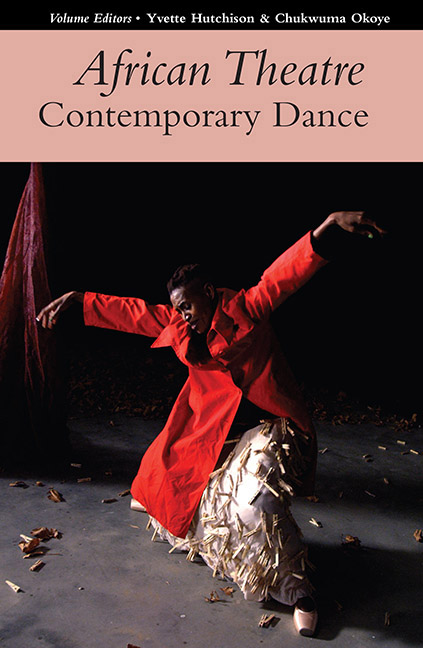Book contents
- Frontmatter
- Contents
- Notes on Contributors
- Introduction
- I Dance
- II Open Section
- Book Reviews
- Valérie K. Orlando, New African Cinema
- Iyunolu Osagie, African Modernity & the Philosophy of Culture in the Works of Femi Euba
- Masitha Hoeane, Mama Mudu's Children: A South African Post-Freedom Tragi-Comedy
- Hope Eghagha, The Oily Marriage
- Ignatius Chukwumah, ed., Joke-Performance in Africa: Mode, Media & Meaning
J.C. Abbey, Ghana's Puppeteer, directed & produced by Steven Feld & the Anyaa Arts Kollektif (2016)
from Book Reviews
Published online by Cambridge University Press: 26 July 2019
- Frontmatter
- Contents
- Notes on Contributors
- Introduction
- I Dance
- II Open Section
- Book Reviews
- Valérie K. Orlando, New African Cinema
- Iyunolu Osagie, African Modernity & the Philosophy of Culture in the Works of Femi Euba
- Masitha Hoeane, Mama Mudu's Children: A South African Post-Freedom Tragi-Comedy
- Hope Eghagha, The Oily Marriage
- Ignatius Chukwumah, ed., Joke-Performance in Africa: Mode, Media & Meaning
Summary
The fifth and to this point final film in Steven Feld's Jazz Cosmopolitanism in Accra series (2009-2016) documents the extraordinary art and craft of Joseph C. Abbey (addressed throughout as Ataa Abbey – ‘Mr. Abbey’), a Ghanaian puppeteer whose career spanned more than half a century until his recent passing in 2017. Abbey's remarkable work has remained largely unknown to the wider world and it is thanks to filmmakers Nii Yemo Nunu and Feld, and their colleague Nii Noi Nortey, the multi-instrumentalist and administrator of the Anyaa Arts Library outside Accra, that we can now get an impression of Abbey's puppetry treasures. While documenting the richness and complexities of individual marionettes and rod puppets, the film at the same time narrates a subjective history of Ghanaian music as seen through Abbey's, and possibly Feld's and Nortey's, eyes. This history is brought alive by Abbey's exceptional puppets and his puppetry skills and the musical backgrounds of those involved in making the film.
Beginning with Kwame Nkrumah's Independence Speech on 6 March 1957, partly re-enacted by a Nkrumah marionette, we are subsequently taken on a puppetry tour de force of selected Ghanaian artists and musical styles, but also of some in neighbouring countries and the diaspora, true to Nkrumah's own philosophy of Pan-Africanism. Abbey watched his first puppet show in 1957, at the age of 12, thus linking the birth of the Ghanaian nation to the birth (or at least ‘conception’) of an artist. The moment Nkrumah requests for ‘the band to play the national anthem’ at the end of his speech, we, as a contemporary audience, do indeed embark on the film's musical puppetry journey.
There are two main narrative strands in the film: while Abbey provides us with the story of his personal development – his apprentice years with E.A. Hanson and Saka Acquaye at the Ministry of Education and the Arts Council of Ghana, who initially taught him ‘carving, painting, stringing and performing puppets’, to his 1977 scholarship for the Jan Malik Puppet Studio in Prague, in the then Czechoslovakia – Nortey is set up as the expert, and expert performer, of Ghanaian musical history which he presents in quasichronological fashion.
- Type
- Chapter
- Information
- African Theatre: Contemporary Dance , pp. 235 - 239Publisher: Boydell & BrewerPrint publication year: 2018



